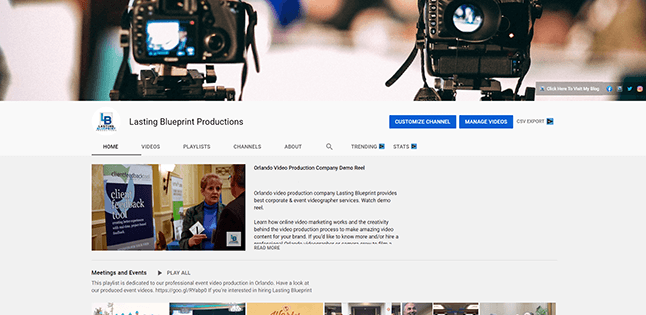Starting a video production company can be an exciting venture. If you’re considering how to start a video production company, there are several key steps to guide you through the process. Whether you’re aiming to establish a small business or a larger enterprise, these tips will help you get started and build a strong foundation in how to start a video production company.
Choosing a Business Name
Selecting a name for your video production company is an important step. This decision is part of the larger process of how to start a video production company, and it should align with your brand and business vision. For example, choosing ‘Lasting Blueprint Productions’ was a thoughtful process that I wrestled with for what seems like forever. Your business name should reflect your brand and be memorable to potential clients. Consider your branding strategy when making this decision, even if it’s not your first step.
Deciding on a Business Structure
Understanding the right structure is essential when learning how to start a video production company. It affects your taxes, liability, and overall operations. Determine the type of business entity that suits your needs, such as an LLC or S-Corp. Each type has its advantages, but an LLC is commonly recommended for video production companies due to liability protection. Research local regulations and business requirements to ensure compliance. You may need a business license to operate as a videographer in your area.
Creating a Website

A professional website is essential for a video production company. Register a domain through providers like GoDaddy or Namecheap and set up a website to showcase your videography, pricing, and contact information. While social media is useful, a website provides a central hub for your business. Consider using platforms like WordPress with themes from ThemeForest to build your site efficiently.
Utilizing Online Platforms
In addition to your website, create profiles on video-sharing platforms such as Vimeo and YouTube. These platforms allow you to showcase your video portfolio. While Vimeo offers a professional touch, YouTube’s larger audience can help increase visibility. If a full website isn’t feasible initially, these platforms can serve as a temporary online presence.

Investing in Business Cards
When learning how to start a video production company, one of the first steps is to invest in a professional business card. This tool can help you make a lasting impression on potential clients. Despite the digital age, business cards remain valuable, affordable, and versatile, allowing you to easily share your contact information. Include your name, business name, phone number, email, and website on your cards.
Building a Social Media Presence
As you learn how to start a video production company, building a strong social media presence becomes crucial. Establish profiles on platforms like Instagram, Twitter, Facebook, and LinkedIn, which offer unique opportunities to showcase your work and connect with potential clients. Depending on your target audience, you might also explore Snapchat and TikTok.
Acquiring Equipment

When figuring out how to start a video production company, it’s important to begin with the right equipment to produce professional-quality work. However, video production equipment can be costly. If you’re just starting out, consider renting equipment from services like LensRentals to keep initial costs down. Renting is common in the industry and doesn’t affect your professional credibility. When you’re ready to purchase, focus on essential gear like a 4K mirrorless camera, a lavalier microphone, and an audio recorder. Also, invest in a good computer and editing software, as these are crucial for video editing.
Choosing a Niche
When learning how to start a video production company, deciding whether to specialize in a particular type of video production or to offer a broad range of services is a critical step. Specializing in a niche, such as event videography or corporate videos, can help you attract clients who are specifically looking for those services. Avoid pursuing projects that do not align with your skills or market demand.
Finding Clients
A key part of understanding how to start a video production company is finding your first clients. To find your first clients, start with your network of friends and family. Utilize platforms like Facebook groups and Craigslist for job postings. Offering services for free might seem tempting but can lead to unrealistic expectations and stress. Instead, consider bartering services or creating mock projects to build your portfolio.
Using Contracts
Another essential aspect of how to start a video production company is ensuring you always use a contract when working with clients. Always use a contract when working with clients. A contract outlines the scope of work, payment terms, and other important details. If you can’t afford a lawyer, look for online contract templates that you can customize for your needs. Having a written agreement protects both you and your client.
Conclusion
Starting a video production company takes patience and small steps. Each decision adds to the foundation you’re building. For more beginner material, visit the resources for videographers page.





